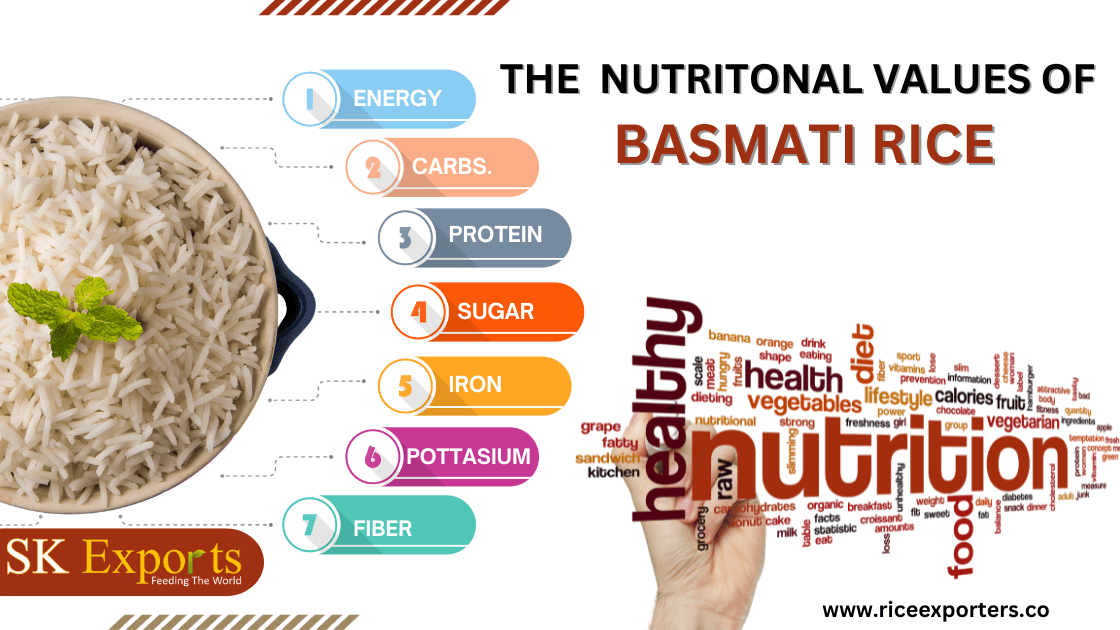When it comes to rice, Basmati stands tall as a fragrant and flavorful variety that has captured the hearts and palates of people worldwide. Beyond its enticing aroma and delightful taste, Basmati rice offers a wealth of nutritional advantages that make it a valuable addition to any diet. In this comprehensive guide, we’ll embark on a flavorful journey to uncover the nutritional wonders of Basmati rice, exploring its composition, health benefits, culinary versatility, and more. So, let’s dive in!
Table of Contents
1. Introduction
– Brief Overview of Basmati Rice
2. Composition of Basmati Rice
– Nutritional Breakdown
– Comparison with Other Rice Varieties
3. Key Nutrients in Basmati Rice
– Carbohydrates
– Protein
– Fiber
– Vitamins
– Minerals
4. Health Benefits of Basmati Rice
– Digestive Health
– Weight Management
– Heart Health
– Blood Sugar Control
5. Basmati Rice vs. Other Rice Varieties
– Nutritional Comparisons
– Glycemic Index
6. Basmati Rice in Traditional Cuisine
– Popular Dishes
– Culinary Versatility
7. Cooking Basmati Rice
– Best Practices
– Cooking Methods
8. Basmati Rice in Modern Diet Trends
– Gluten-Free Diet
– Vegan and Vegetarian Diets
9. Basmati Rice in Global Markets
– Export and Demand
– Sustainable Farming Practices
10. Conclusion
– Summing Up the Nutritional Advantages
Introduction
Basmati rice, often hailed as the “Prince of Rice,” is a long-grain variety known for its delicate aroma and slender, elegant grains. But what sets it apart is not just its exquisite fragrance and flavor; it’s the nutritional advantages it brings to the table. Basmati rice is more than just a culinary delight; it’s a wholesome addition to your diet that offers a range of health benefits.
Composition of Basmati Rice
Nutritional Breakdown
Let’s start by breaking down the nutritional composition of Basmati rice. Per 100 grams of cooked Basmati rice, you can expect:
– Calories: Approximately 130-150 calories
– Carbohydrates: Around 28-32 grams
– Protein: About 2-3 grams
– Fiber: Approximately 0.5-1 gram
Comparison with Other Rice Varieties
Basmati rice is often compared to other rice varieties, such as long-grain, short-grain, and brown rice. We’ll explore how Basmati rice stacks up in terms of nutritional content and why it stands out.
Key Nutrients in Basmati Rice
Carbohydrates
The primary macronutrient in Basmati rice is carbohydrates. These complex carbohydrates provide a steady source of energy, making it an excellent choice for athletes and active individuals.
Protein
While rice is not typically considered a significant source of protein, Basmati rice does contain some protein, which can contribute to your daily intake, especially in vegetarian diets.
Fiber
Though Basmati rice is not as high in fiber as brown rice, it still provides a moderate amount. Dietary fiber aids in digestion and can help maintain a feeling of fullness.
Vitamins
Basmati rice contains essential vitamins, including B vitamins like niacin and thiamine. These vitamins play a crucial role in metabolism and overall health.
Minerals
Minerals like potassium and magnesium are present in Basmati rice. Potassium is vital for heart health, and magnesium supports various bodily functions.
Health Benefits of Basmati Rice
Basmati rice offers an array of health benefits, making it a smart choice for those seeking both taste and nutrition in their meals.
Digestive Health
The fiber in Basmati rice supports a healthy digestive system by preventing constipation and promoting regular bowel movements.
Weight Management
Basmati rice’s low-fat content, coupled with its ability to provide sustained energy, can aid in weight management by helping control calorie intake.
Heart Health
The absence of saturated fats and cholesterol in Basmati rice makes it a heart-healthy choice. Additionally, its potassium content may help regulate blood pressure.
Blood Sugar Control
Basmati rice has a lower glycemic index compared to some other rice varieties, which means it can help stabilize blood sugar levels, making it suitable for people with diabetes.
Basmati Rice vs. Other Rice Varieties
Nutritional Comparisons
We’ll delve into detailed nutritional comparisons between Basmati rice and other commonly consumed rice varieties to highlight its nutritional advantages.
Glycemic Index
The glycemic index (GI) measures how quickly a food raises blood sugar levels. We’ll explore how Basmati rice fares on the GI scale and what it means for your health.
Basmati Rice in Traditional Cuisine
Popular Dishes
Basmati rice is a staple in many traditional dishes worldwide. We’ll take a culinary tour to discover the delightful dishes it graces.
Culinary Versatility
Its long grains and exquisite flavor make Basmati rice incredibly versatile. We’ll explore its applications in various cuisines and cooking methods.
Cooking Basmati Rice
Best Practices
Cooking Basmati rice to perfection requires some know-how. We’ll provide tips and best practices to ensure you achieve that fluffy, aromatic result every time.
Cooking Methods
We’ll explore different cooking methods, including traditional stovetop cooking and the convenience of rice cookers.
Basmati Rice in Modern Diet Trends
Gluten-Free Diet
For those following a gluten-free diet, Basmati rice is a safe and delicious option.
Vegan and Vegetarian Diets
Basmati rice complements vegan and vegetarian diets perfectly, providing essential nutrients and a delightful eating experience.
Basmati Rice in Global Markets
Export and Demand
Basmati rice is in high demand globally. We’ll look at its export market and why it’s sought after worldwide.
Sustainable Farming Practices
Sustainability is a growing concern in agriculture. We’ll explore how Basmati rice farming is adapting to meet environmental and ethical standards.
Conclusion
In this extensive exploration of Basmati rice, we’ve uncovered not only its irresistible taste and aroma but also its significant nutritional advantages. Whether you’re savoring it in traditional dishes or incorporating it into modern diet trends, Basmati rice is more than just a culinary delight—it’s a smart choice for a healthier and more flavorful life. So, embrace the wonders of Basmati rice and savor the taste of a healthier tomorrow
